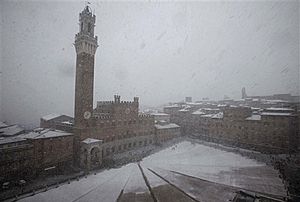
The wettest summer on record in Britain was followed by a harsh winter that took lives and caused millions of dollars worth of damage, both structural and economic.
January was the eighth coldest on record and the U.K.'s worst since 1987.
Precise snowfall records are notoriously hard to find for Europe; however, record snowfall affected London and parts of Scotland this winter. In one 16-hour storm Perth, Scotland, received 13 inches of snow.
The Channel Tunnel or "Chunnel" train's lines froze due to heavy snow and cold temperatures, stranding thousands of passengers. This was the first time the tunnel faced such extreme overnight temperatures.
The tunnels opened in 1994 and the 31.4 mile undersea rail link carries millions of passengers each year. February saw a drop in passengers by almost 20 percent as people feared that it would not cope with the extremities of winter.
In early February, local councils and municipalities in Britain were on short supplies of salt after the big freeze. Salt shortages, transport nightmares and travel chaos continued into late February.
London was paralyzed for days as heavy snow fell on the capital, and with temperatures staying below freezing, road conditions were treacherous.
Insurers paid out $979 million from 335,000 claims made as a result of damage caused by the wintry weather in the U.K., according to a recent BBC report.
The biggest chunk of the payout was to motorists who damaged vehicles on the slippery roads, according to the Association of British Insurers.
The bad weather hit businesses and consumers, as the retail and the housing markets suffered.
Spain, France and Italy also saw unseasonable snowfall in March, much to the dismay of residents and tourists alike.
Snow melt and rising waters once again plagued Venice, and a report released in March, 2010 suggested the problem in the canal city is worsening.
France was affected daily by widespread power outages as the nation turned up the heat to cope with the wintry weather.
The death toll in Poland alone from the winter months was into triple digits, which is comparable to the winter of 1999 in which 172 people froze to death.
Fierce rain and hurricane-strength winds battered France, Spain, Germany and Portugal. Hundreds were injured and a dozen people have been reported missing. In Southern France, 18 people were killed by debris ripped off of buildings and trees by the wind.
The national weather agency says a violent cyclone depression that had formed over the Atlantic Ocean is to blame. The Free University of Berlin named the storm Xynthia.
The tail end of Xynthia lead to the Thames in London bursting its banks after heavy rainfall at the end of March. House boats and million dollar homes in Westminister were flooded.
The recovery will be slow as homes and lives are rebuilt. More expensive home and car insurance, higher flight prices and an increase in electricity costs are just some of the issues that will plague parts of Europe as we head into spring.



Reader Comments
to our Newsletter